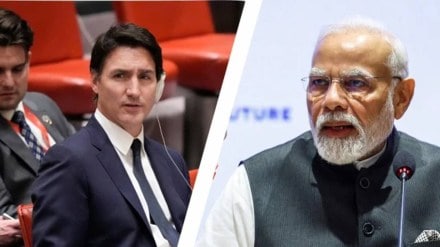Canadian Prime Minister Justin Trudeau’s latest press conference once again underscored the ongoing diplomatic row between India and Canada, but according to sources, it failed to offer anything new. Described as “the same old Trudeau saying the same old things for the same old reasons,” the press conference focused on allegations that India was involved in criminal activities on Canadian soil. However, the Indian side has continued to categorically deny the claims, calling the accusations vague and lacking in evidence.
The Central Claim: Credible Evidence?
At the core of Trudeau’s press conference was a repeated assertion by Canadian officials that “credible evidence” had been presented to India. This was echoed by Canada’s Chargé d’Affaires (Cd’A) to the press. But, sources on the Indian side pushed back strongly, noting that no substantial evidence had been provided. “From the very beginning, the Canadian approach has been to make vague accusations and put the burden of denial on India,” sources said.
This sentiment was reinforced during a Royal Canadian Mounted Police (RCMP) press briefing, where connections between certain individuals and India were discussed. However, sources noted that “in no case were any specifics provided.” Instead, the focus appeared to be on general accusations without any concrete proof, leaving India to refute claims that lack details.
Diplomatic Fallout Escalates
The strained relationship between the two nations has only intensified in the past few weeks. The diplomatic spat first came into the spotlight in September 2023, when Trudeau accused India of involvement in the killing of Hardeep Singh Nijjar, a pro-Khalistan leader and Canadian citizen. India called the accusations “absurd” and “politically motivated.” Despite repeated denials, the issue has continued to dominate the bilateral agenda, with both sides taking significant diplomatic actions.
Earlier this week, Canadian federal police alleged that “agents” of the Indian government were collaborating with organized criminal elements, including the infamous Bishnoi gang, to “target the South Asian community, specifically pro-Khalistani elements” in Canada. This claim added further fuel to the fire, following the expulsion of six diplomats—three from each side—including Canada’s acting High Commissioner, Stewart Wheeler, and India’s High Commissioner, Sanjay Verma. India subsequently pulled its remaining staff, citing security concerns.
India, in turn, issued a rebuttal, condemning Trudeau’s government for its “preposterous imputations” and accusing him of playing to a “political agenda” ahead of the next federal election in Canada. Indian sources highlighted that despite extensive diplomatic engagement between the two countries over the past year, the Canadian government has escalated its stance rather than seeking constructive dialogue.
Timeline of Events: A Diplomatic Spiral
June 2023: The Nijjar Assassination
• Hardeep Singh Nijjar, a prominent figure in the Khalistani movement, was killed outside a gurdwara in Vancouver. Nijjar had long been on India’s radar, listed as the “mastermind” of the Khalistani Tiger Force, a designated terror organization. India had issued a cash reward for his capture due to his involvement in the murder of a Hindu priest in Punjab.
July 2023: Tensions Mount
• India officially requested that Canada take action against Khalistani separatists. This came after security breaches at Indian consulates in the U.S. and Canada, where protests and threats from extremist elements had caused significant concern for Indian officials.
September 2023: Trudeau’s First Accusation
• At a press conference in September, Trudeau made the explosive claim that “agents” of the Indian government were involved in Nijjar’s assassination. This statement sent shockwaves through diplomatic circles, prompting India to issue a firm denial and warning against the dangerous implications of making such unverified accusations.
October 2023: Diplomatic Expulsions
• In response to the escalating row, both countries ejected a series of diplomats. This culminated in the expulsion of high-ranking envoys like Canada’s acting High Commissioner and India’s High Commissioner. India further stated that its staff were being withdrawn over safety concerns, marking a new low in bilateral relations.
October 2023: Trudeau’s Latest Press Conference
• During this press event, Trudeau doubled down on previous claims, stating that India was involved in “murders, extortion, and other violent acts” on Canadian soil. He further claimed that Canadian police had attempted to engage with Indian officials but had been rebuffed. However, Indian sources described these claims as an attempt to deflect from domestic political issues, with no substantial evidence being presented.
Trade Talks Stalled
Amid the growing diplomatic tensions, the ongoing trade talks between India and Canada have also taken a hit. In early September, Canada’s Trade Minister Mary Ng announced that the discussions, which had been in progress since 2010, were being paused. The minister cited the need to investigate the “credible allegations” against India, though she stopped short of directly linking the pause in talks to the Nijjar case.
This decision came just days before Trudeau attended the G20 summit in India. During his visit, Prime Minister Narendra Modi reportedly expressed concerns about “anti-India activities” being permitted on Canadian soil, further straining ties between the two countries.
Canada’s Internal Challenges
Sources suggest that Trudeau’s continued focus on the India issue is an attempt to galvanize domestic support ahead of elections. Canada’s internal politics, especially surrounding its handling of Khalistani separatists and its large Sikh diaspora, have created a complex situation.
In June 2023, the Canadian Parliament observed a moment of silence to mark the one-year anniversary of Nijjar’s death. This action drew a sharp rebuke from India, which opposed the political space being given to what it described as extremist elements advocating violence. India’s consulate in Vancouver responded by commemorating the 329 victims of the 1985 Air India bombing carried out by Khalistani terrorists.
The International Perspective
The United States has also weighed in on the diplomatic spat, expressing concern over Canada’s allegations. Washington has called on India to take the claims seriously, though it has stopped short of fully endorsing Trudeau’s accusations. However, India remains firm in its stance, having set up a high-level committee to investigate the charges.
